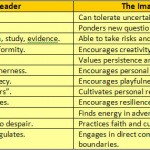I continue to observe manifestations of how anxiety can lead to a search for security. Even before the current manic anxiety related to the financial crises, but more so now because of it, I have been observing reactivity taking the form of people seeking certitude in a time of uncertainty. But the fact is that security, guarantees, and certitudes are myths. Helen Keller wrote,
Security is mostly a superstition. It does not exist in nature, nor do the children of men as a whole experience it. Avoiding danger is no safer in the long run than outright exposure. The fearful are caught as often as the bold. Faith alone defends.
The field in which I work, theological education, has not been immune to the challenges of the times. Seminaries are closing, donations are down, and downsizing, rightsizing, and selling off of assets are common responses across the landscape and denominations. And in the spirit of misery loves company I don’t know how many times I’ve heard someone say something along the lines of, “It is predicted that within the next decade thirty seminaries will close.” And while the number of seminaries cited and the length of time vary with the speaker, the voice of doom is consistent.
In the midst of this anxiety I observe many seeking the myth of security, mostly manifested in reactivity. People demand assurances, trustees demand accountability, denominations point fingers, and faculty herd by forming clubs or guilds or senates or unions. Some faculty move from one school to another in search of security only to discover that the state of affairs is the same all over—there is no greener grass to be had.
The irony is that in anxious times what is needed is not a search for safety or certitude, but a boldness of adventure and imagination. The contrast between these two stances as applied to leaders can be striking. Click on the thumbnail chart below:


